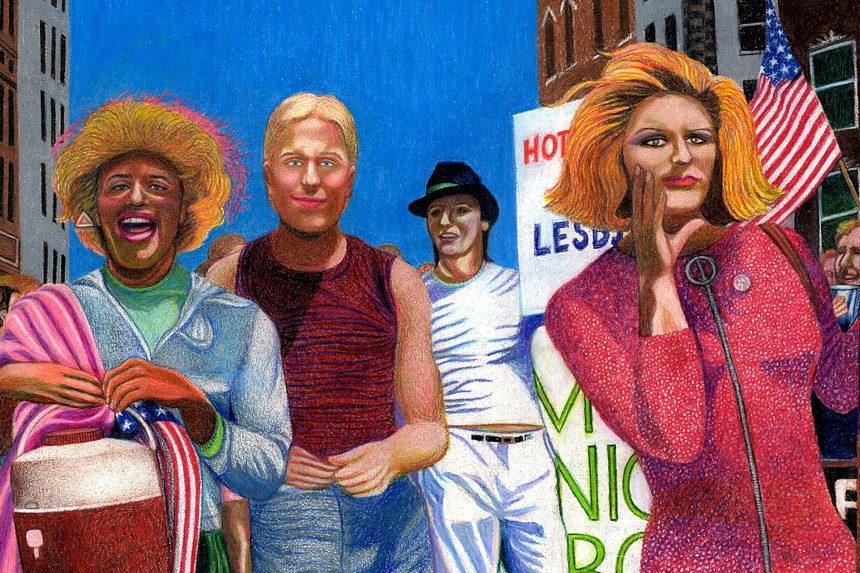There was more rainbow at my first Gay Pride than I had anticipated. I had expected some, of course, but the bandanas, the face paint, the abundance of waving flags — the sheer volume of color was startling. Still more striking was the number of people. Thousands joined in the city to celebrate the LGBTQ+ community, some wearing “I am proud of my gay son” T-shirts, some same-sex couples unapologetically kissing or holding hands, and everyone taking a stand to support the historically marginalized community.
I was a 16-year-old then, in 2016, trotting through Indianapolis with my family and friends. Even though I chose to attend Pride, it would be another year before I realized my own bisexuality. And while I understood that Pride was part of a social movement, I was shocked to learn about the violent origins of Pride and struggled to reconcile those dark days with the joyous, colorful event I had attended.
The first Pride event was held in New York on June 28, 1970, as a way to remember the Stonewall Riots that had occurred the year before. On that day in 1969, police raided the Stonewall Inn — a gay bar that was refuge to many members of the community who had been rejected by their families — arresting and aggressively handling 13 people. As a woman was shoved into a police car, she called to the bystanders to do something — and they did. The Stonewall Riots lasted six days.
A notable figure in these protests was Marsha P. Johnson, a 23-year-old, transgender black woman who was an important activist for the LGBTQ+ community. Johnson is often credited with throwing the first brick in the Stonewall Riots, though she later told a historian she arrived after it started. Born in 1945, Johnson began wearing dresses at age five but stopped because of the criticism she faced. In adulthood, she was known for her amazing, colorful outfits that were occasionally decked out with fake fruit or Christmas lights.
Her advocacy began in the 1960s after she graduated from college and moved to New York City’s Greenwich Village, the most tolerant place for LGBTQ+ people at the time — but still not a safe one. Until 1966, serving alcohol to gay people was illegal in New York City, and even afterward, public displays of homosexual behavior — including same-sex dancing, holding hands, and kissing — as well as cross-dressing, were prohibited. Places that allowed LGBTQ+ people to openly socialize, like Stonewall, were often raided by police.
Like many other LGBTQ+ people, Johnson was unable to get much work and was homeless for most of her life, making money as a sex worker and later a drag queen. The term transgender did not exist at this time, but Johnson used she/her/hers pronouns and dubbed herself Marsha P., for “Pay It No Mind,” as a response to the numerous questions about her gender.
The gay movement took off after the Stonewall Riots, and Johnson evolved with it. She opened the first homeless shelter for LGBTQ+ people and started Street Transvestite Action Revolutionaries, or STAR, with the help of her friend and fellow activist Sylvia Rivera, a Latina drag queen, while also supporting the Gay Liberation Front and the Gay Activists Alliance. STAR was established as a home for transgender people as well as a community that advocated for equal rights. Johnson and Rivera worked for their money on the streets so they could support and house other LGBTQ+ people. STAR lasted only until 1973, but it is still considered a model for other advocacy groups.
Despite her selfless work, Marsha P. Johnson — “Saint Marsha” to her friends — was met with discrimination from both the straight and gay communities. Some gays and lesbians distanced themselves from the transgender community in hopes of gaining wider public support. During early Pride parades, Johnson and the other members of STAR were placed in the back, and Rivera was even booed off the stage when she tried to speak. Still, Johnson continued to support the LGBTQ+ community, working as an AIDS activist in the ’80s and ’90s until her death.
Johnson’s body was discovered on July 6, 1992, in the Hudson River. Her death was initially deemed a suicide, but after protests from her loved ones, the cause of death was changed to drowning from unknown causes later that year. The case was eventually reopened in 2012, largely due to the work of transgender activist Mariah Lopez. Many believe it was a murder — the case is still open.
Johnson’s death wasn’t publicized much when it happened; however, with time, she is getting her deserved recognition. In 2019, the New York City Department of Cultural Affairs and the public arts campaign She Built NYC announced plans to build a monument honoring Marsha P. Johnson and Sylvia Rivera for their work as LGBTQ+ activists. It was scheduled to be finished in 2021, but the coronavirus pandemic may push that date back. It will be the first statue depicting transgender people in the United States.
For 50 years, Pride has been a manifestation of its original chant — “Say it loud, gay is proud” — as LGBTQ+ members and allies gather to march, chant, and show the public the LGBTQ+ community. Pride has evolved from a protest to a movement: President Clinton established June as Pride Month; President Obama declared the area around the Stonewall Inn and nearby Christopher Park a national monument; celebrities, including Madonna, have performed in Pride events; and companies like Nike have produced rainbow apparel in support of the movement.
Each year I am swept up by the dancing, the free hugs booths, and the colorful, often sparkly outfits. These parts of Pride are great in their own right, but in the midst of this excitement, it is easy to forget the struggles early LGBTQ+ people faced and remember that Pride is not just a celebration: It is an ongoing struggle for equality. Even with our progress, we are still working to create a society where Marsha P. Johnson could live without judgement.
Featured image: Illustration of Marsha P. Johnson, Joseph Ratanski and Sylvia Rivera in the 1973 NYC Gay Pride Parade by Gary LeGault (Dramamonster (Gary LeGault) via the GNU Free Documentation License and the Creative Commons Attribution-Share Alike 4.0 International license.)
Become a Saturday Evening Post member and enjoy unlimited access. Subscribe now




Comments
To the first comment (the one at the bottom), I would just like to say that I understand your opinion on the matter, but I respectfully disagree. Please, dear sir, tell me exactly where in the Bible it says that homosexuality is a sin? Because the only passage I can think of- which I assume is the passage that you base your whole argument on- was originally written to say that a man shouldn’t sleep with a boy. It’s about molestation, not homosexuality.
As for your views on being transgender, there are various parts of the Bible where God says we are only humans in His eyes. Please refer to this article if you have any other questions or would like to leave a scathing and not-very-Christianly comment there. https://www.thedailybeast.com/what-does-the-bible-teach-about-transgender-people
Also, the Bible tells us to love our neighbors and to not judge others until we, ourselves, are considered perfect. And considering you ended your comment calling the people who work at this publication “mindless, or worse, groveling cowards,” I would guess that you are not perfect. Unless you are Jesus. Then again, Jesus wouldn’t have ever said something so rude and hurtful to anyone. I would also just like to point out that this is a logical fallacy know as an ad hominem argument, which is when a person attacks the person giving their opinion rather than the opinion itself.
Lastly, for the author of this piece, I would like to thank you for the wonderful article. It was very informative and I can tell that you spent a lot of time and effort making it. Please keep writing because I look forward to reading more of what you have to say.
Have a wonderful day, everyone.
So I have a few thoughts about the above comment…. Gay people are just normal people, not the terrible sinners you make them out to be. And people who stand up for them or recognize them as equal are just good humans, not shameful cowards. I think it is very strong of the SEP, and especially this new and talented writer, to create and post this article in a world where people dislike others for their sexuality. I feel like this article is well written, historical and yet interesting, and has a valuable place in this periodical. If the SEP has lost your subscription, they have gained mine, and hopefully others.
I’m all in favor of people living their lives as they choose. But part of what used to be called the social contract was that responsible adults who might be living lives which would appall the more traditional would live them with discretion, which means they would for the sake of others, especially children, conduct themselves becomingly when in contact with the general public.
Let me say this: Pride is a lie of the Devil. Homosexuality is, and always will be, sinful. Transgenderism is a spitting in the face of God, who designed us in His image, and chose which sex we would be.
I wonder if the editors of The Saturday Evening Post ever consider Eternity, and eternal consequences, ever think about God, ever contemplate where this is all going, ultimately?
I do know this: after reading the above article, I will never spend another penny on a subscription renewal. And yes, you should be ashamed of yourselves. At a time of great moral testing, and spiritual winnowing, you have proven yourselves to be either mindless, or worse, groveling cowards.